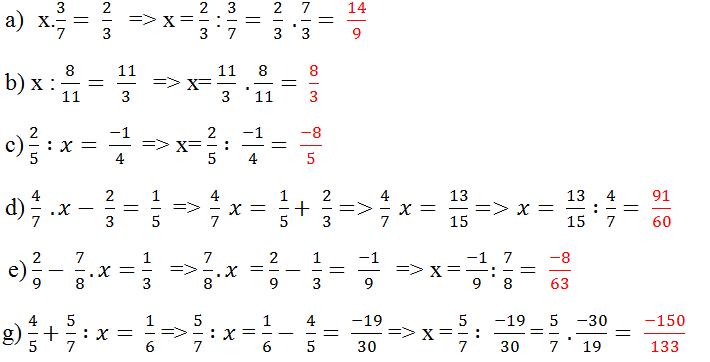Hãy nhập câu hỏi của bạn vào đây, nếu là tài khoản VIP, bạn sẽ được ưu tiên trả lời.

Ta có :
\(\frac{x+1}{2004}+\frac{x+2}{2003}+\frac{x+3}{2002}+35=2^5\)
\(\Leftrightarrow\)\(\frac{x+1}{2004}+\frac{x+2}{2003}+\frac{x+3}{2002}=2^5-35\)
\(\Leftrightarrow\)\(\left(\frac{x+1}{2004}+1\right)+\left(\frac{x+2}{2003}+1\right)+\left(\frac{x+3}{2002}+1\right)=32-35+3\)
\(\Leftrightarrow\)\(\frac{x+2005}{2004}+\frac{x+2005}{2003}+\frac{x+2005}{2002}=-3+3\)
\(\Leftrightarrow\)\(\left(x+2005\right)\left(\frac{1}{2004}+\frac{1}{2003}+\frac{1}{2002}\right)=0\)
Vì \(\frac{1}{2004}+\frac{1}{2003}+\frac{1}{2002}\ne0\)
Nên \(x+2005=0\)
\(\Rightarrow\)\(x=-2005\)
Vậy \(x=-2005\)
Chúc bạn học tốt ~
Ta có: \(\frac{x+1}{2004}+\frac{x+2}{2003}+\frac{x+3}{2002}+35=2^5\)
\(\Rightarrow\frac{x+1}{2004}+\frac{x+2}{2003}+\frac{x+3}{2002}=2^5-35\)
\(\Rightarrow\frac{x+1}{2004}+\frac{x+2}{2003}+\frac{x+3}{2002}=-3\)
\(\Rightarrow\frac{x+1}{2004}+1+\frac{x+2}{2003}+1+\frac{x+3}{2002}+1=-3+3\)
\(\Rightarrow\frac{x+1+2004}{2004}+\frac{x+2+2003}{2003}+\frac{x+3+2002}{2002}=0\)
\(\Rightarrow\frac{x+2005}{2004}+\frac{x+2005}{2003}+\frac{x+2005}{2002}=0\)
\(\Rightarrow\left(x+2005\right)\left(\frac{1}{2004}+\frac{1}{2003}+\frac{1}{2002}\right)=0\)
Vì \(\frac{1}{2004}+\frac{1}{2003}+\frac{1}{2002}\ne0\)
Nên x + 2005 = 0
=> x = -2005
Vậy x = -2005

\(\frac{x+1}{2004}+\frac{x+2}{2003}+\frac{x+3}{2002}\) + 35 = \(^{2^5}\)
\(\frac{x+1}{2004}+\frac{x+2}{2003}+\frac{x+3}{2002}\) = -3
\(\left(\frac{x+1}{2004}+1\right)+\left(\frac{x+2}{2003}+1\right)+\left(\frac{x+3}{2002}+1\right)\) = 0
\(\left(\frac{x+1}{2004}+\frac{2004}{2004}\right)+\left(\frac{x+2}{2003}+\frac{2003}{2003}\right)+\left(\frac{x+3}{2002}+\frac{2002}{2002}\right)\)= 0
\(\left(\frac{x+2005}{2004}\right)+\left(\frac{x+2005}{2003}\right)+\left(\frac{x+2005}{2002}\right)\)= 0
\(\left(x+2005\right).\left(\frac{1}{2004}+\frac{1}{2003}+\frac{1}{2002}\right)\) = 0
\(\left(x+2005\right)\) = 0 \(:\left(\frac{1}{2004}+\frac{1}{2003}+\frac{1}{2002}\right)\)
\(\left(x+2005\right)\) = 0
\(x\) = 0-2005
\(x\) = -2005

c) \(\dfrac{x+1}{35}+\dfrac{x+2}{34}+\dfrac{x+3}{33}=\dfrac{x+4}{32}+\dfrac{x+5}{31}+\dfrac{x+6}{30}\)
\(\Rightarrow\dfrac{x+1}{35}+1+\dfrac{x+2}{34}+1+\dfrac{x+3}{33}+1=\dfrac{x+4}{32}+1+\dfrac{x+5}{31}+1+\dfrac{x+6}{30}+1\)
\(\Rightarrow\dfrac{x+1+35}{35}+\dfrac{x+2+34}{34}+\dfrac{x+3+33}{33}=\dfrac{x+4+32}{32}+\dfrac{x+5+31}{31}+\dfrac{x+6+30}{30}\)
\(\Rightarrow\dfrac{x+36}{35}+\dfrac{x+36}{34}+\dfrac{x+36}{33}=\dfrac{x+36}{32}+\dfrac{x+36}{31}+\dfrac{x+36}{30}\)
\(\Rightarrow\dfrac{x+36}{35}+\dfrac{x+36}{34}+\dfrac{x+36}{33}-\dfrac{x+36}{32}-\dfrac{x+36}{31}-\dfrac{x+36}{30}=0\)
\(\Rightarrow\left(x+36\right)\left(\dfrac{1}{35}+\dfrac{1}{34}+\dfrac{1}{33}+\dfrac{1}{32}+\dfrac{1}{31}+\dfrac{1}{30}\right)=0\)
\(\Rightarrow x+36=0\left(\text{vì }\dfrac{1}{35}+\dfrac{1}{34}+\dfrac{1}{33}+\dfrac{1}{32}+\dfrac{1}{31}+\dfrac{1}{30}\ne0\right)\)
\(\Rightarrow x=-36\)
Vậy ...
a/ Ta có: \(-4\dfrac{3}{5}.2\dfrac{4}{3}\le x\le-2\dfrac{3}{5}:1\dfrac{6}{15}\)
\(\Rightarrow\dfrac{-23}{5}.\dfrac{10}{3}\le x\le\dfrac{-13}{5}:\dfrac{21}{15}\)
\(\Rightarrow\dfrac{-46}{3}\le x\le\dfrac{-13}{5}.\dfrac{15}{21}\)
\(\Rightarrow\dfrac{-46}{3}\le x\le\dfrac{-13}{7}\)
\(\Rightarrow-15,\left(3\right)\le x\le-1,\left(857142\right)\)
Vì x \(\in\) Z nên x \(\in\left\{-1;-2;-3;...;-15\right\}\)
Chúc bạn học tốt!!!![]()
![]()
![]()

9) \(\dfrac{x}{4}=\dfrac{9}{x}\)
Theo định nghĩa về hai phân số bằng nhau, ta có:
\(4\cdot9=x^2\\ 36=x^2\Rightarrow\left[{}\begin{matrix}x=6\\x=-6\end{matrix}\right.\)
8)
\(x:\dfrac{5}{3}+\dfrac{1}{3}=-\dfrac{2}{5}\\ x:\dfrac{5}{3}=-\dfrac{2}{5}+\dfrac{1}{3}\\ x:\dfrac{5}{3}=-\dfrac{1}{15}\\ x=\dfrac{1}{15}\cdot\dfrac{5}{3}\\ x=\dfrac{1}{9}\)
7)
\(2x-16=40+x\\ 2x-x=40+16\\ x\left(2-1\right)=56\\ x=56\)
6)
\(1\dfrac{1}{2}+x=\dfrac{3}{2}-7\\ \dfrac{3}{2}+x=\dfrac{3}{2}-7\\ \dfrac{3}{2}-\dfrac{3}{2}=-7-x\\ -7-x=0\\ x=-7-0\\ x=-7\)
5)
\(3\dfrac{1}{2}-\dfrac{1}{2}x=\dfrac{2}{3}\\ \dfrac{7}{2}-\dfrac{1}{2}x=\dfrac{2}{3}\\ \dfrac{1}{2}x=\dfrac{7}{2}-\dfrac{2}{3}\\ \dfrac{1}{2}x=\dfrac{17}{6}\\ x=\dfrac{17}{6}:\dfrac{1}{2}\\ x=\dfrac{17}{3}\)
4)
\(x\cdot\left(x+1\right)=0\Rightarrow\left[{}\begin{matrix}x=0\\x+1=0\end{matrix}\right.\Rightarrow\left[{}\begin{matrix}x=0\\x=-1\end{matrix}\right.\)
3)
\(\left(\dfrac{2x}{5}+2\right):\left(-4\right)=-1\dfrac{1}{2}\\ \left(\dfrac{2x}{5}+2\right):\left(-4\right)=-\dfrac{3}{2}\\ \dfrac{2x}{5}+2=-\dfrac{3}{2}\cdot\left(-4\right)\\ \dfrac{2x}{5}+2=6\\ \dfrac{2x}{5}=6-2\\ \dfrac{2x}{5}=4\\ 2x=4\cdot5\\ 2x=20\\ x=20:2\\ x=10\)
2)
\(\dfrac{1}{3}+\dfrac{1}{2}:x=-0,25\\ \dfrac{1}{3}+\dfrac{1}{2}:x=-\dfrac{1}{4}\\ \dfrac{1}{2}:x=-\dfrac{1}{4}-\dfrac{1}{3}\\ \dfrac{1}{2}:x=-\dfrac{7}{12}\\ x=\dfrac{1}{2}:-\dfrac{7}{12}\\ x=-\dfrac{6}{7}\)
1)
\(\dfrac{4}{3}+x=\dfrac{2}{15}\\ x=\dfrac{2}{15}-\dfrac{4}{3}x=-\dfrac{6}{5}\)

\(B=\dfrac{2005}{x^m}+\dfrac{2003}{x^n}=\dfrac{2004}{x^m}+\dfrac{1}{x^m}+\dfrac{2004}{x^n}-\dfrac{1}{x^n}=A+\left(\dfrac{1}{x^m}-\dfrac{1}{x^n}\right)\)
\(\Rightarrow A< B\)
mình ko bt đúng hay sai nữa

1) \(x:\dfrac{2}{3}=150\)
\(\Leftrightarrow x=150.\dfrac{2}{3}\)
\(\Leftrightarrow x=100\).
2) \(\dfrac{35}{9}:x=\dfrac{35}{6}\)
\(\Leftrightarrow x=\dfrac{35}{9}:\dfrac{35}{6}\)
\(\Leftrightarrow x=\dfrac{2}{3}\).
3) \(\dfrac{49}{7}:x=\dfrac{49}{5}\)
\(\Leftrightarrow x=\dfrac{49}{7}:\dfrac{49}{5}\)
\(\Leftrightarrow x=\dfrac{5}{7}\).
4) \(1-\left\{5\dfrac{4}{9}+x-7\dfrac{7}{18}\right\}:15\dfrac{3}{5}=0\)
\(\Leftrightarrow1-\left\{\dfrac{49}{9}+x-\dfrac{133}{18}\right\}:\dfrac{78}{5}=0\)
\(\Leftrightarrow\left\{\dfrac{-35}{18}+x\right\}:\dfrac{78}{5}=1-0\)
\(\Rightarrow\dfrac{-35}{18}+x=1.\dfrac{78}{5}\)
\(\Leftrightarrow\dfrac{-35}{18}+x=\dfrac{78}{5}\)
\(\Rightarrow x=\dfrac{1579}{90}\).
Gọi a,b,c.. cho dễ nhé.Thớt vui tính quá, dấu phẩy cũng không viết hộ con dân =)))
a, \(x:\dfrac{2}{3}=150\)
\(\Leftrightarrow x=150.\dfrac{2}{3}\)
\(\Leftrightarrow x=100\)
Vậy...
b, \(\dfrac{35}{9}:x=\dfrac{35}{6}\)
\(\Leftrightarrow x=\dfrac{35}{9}:\dfrac{35}{6}\)
\(\Leftrightarrow x=\dfrac{2}{3}\)
Vậy...
c, \(\dfrac{49}{7}:x=\dfrac{49}{5}\)
\(\Leftrightarrow x=\dfrac{49}{7}:\dfrac{49}{5}\)
\(\Leftrightarrow x=\dfrac{5}{7}\) Vậy...
d, \(1-\left\{5\dfrac{4}{9}+x-7\dfrac{7}{18}\right\}:15\dfrac{3}{4}=0\)
\(\Leftrightarrow1-\left\{\dfrac{49}{9}+x-\dfrac{133}{18}\right\}:\dfrac{63}{4}=0\)
\(\Leftrightarrow1-\left\{x-\dfrac{35}{18}\right\}:\dfrac{63}{4}=0\)
\(\Leftrightarrow1-\left(\dfrac{\left(18x-35\right).4}{18.63}\right)=0\)
\(\Leftrightarrow1-\left(\dfrac{72x-140}{1134}\right)=0\)
\(\Leftrightarrow1-\dfrac{72x-140}{1134}=0\)
\(\Leftrightarrow\dfrac{1134-72x+140}{1134}=0\)
\(\Leftrightarrow1274-72x=0\)
\(\Leftrightarrow72x=1274\)
\(\Leftrightarrow x=\dfrac{637}{36}\)
Vậy...

\(\dfrac{x+1}{2004}+\dfrac{x+2}{2003}+\dfrac{x+3}{2002}+35=2^5\)
\(pt\Leftrightarrow\dfrac{x+1}{2004}+\dfrac{x+2}{2003}+\dfrac{x+3}{2002}+3=0\)
\(\Leftrightarrow\dfrac{x+1}{2004}+1+\dfrac{x+2}{2003}+1+\dfrac{x+3}{2002}+1=0\)
\(\Leftrightarrow\dfrac{x+1}{2004}+\dfrac{2004}{2004}+\dfrac{x+2}{2003}+\dfrac{2003}{2003}+\dfrac{x+3}{2002}+\dfrac{2002}{2002}=0\)
\(\Leftrightarrow\dfrac{x+2005}{2004}+\dfrac{x+2005}{2003}+\dfrac{x+2005}{2002}=0\)
\(\Leftrightarrow\left(x+2005\right)\left(\dfrac{1}{2004}+\dfrac{1}{2003}+\dfrac{1}{2002}\right)=0\)
\(\Rightarrow x+2005=0\). Do \(\dfrac{1}{2004}+\dfrac{1}{2003}+\dfrac{1}{2002}\ne0\)
\(\Rightarrow x=-2005\)
thank you